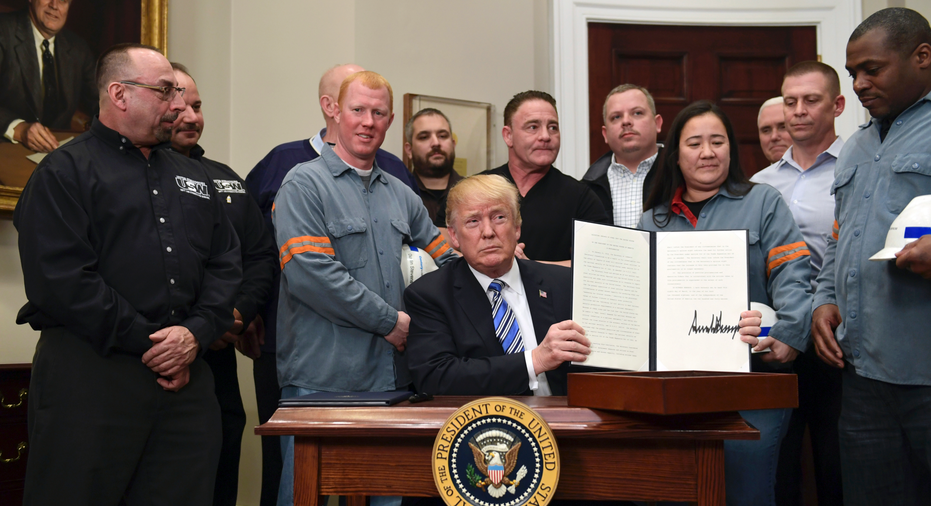Q&A: How tariffs would work _ and whether they likely will

WASHINGTON – Ever a deal-maker, President Donald Trump is making a bold gamble by inviting the countries of the world to negotiate their way out of heavy new taxes on steel and aluminum imported to the United States.
When Trump announced Thursday that he was slapping tariffs of 25 percent on imported steel and 10 percent on aluminum, he temporarily exempted big steel producers Canada and Mexico — provided they agree to renegotiate a North American trade deal to his satisfaction.
Other countries, too, could be spared, the president said, if they can convince the administration that their steel and aluminum exports don't threaten American industry.
By offering countries a way to escape the tariffs, Trump might have eased the risk of a destructive trade war. At least for now.
But "it introduces a lot of uncertainty," says Wendy Cutler, a former U.S. trade official now at the Asia Society Policy Institute. "You're going to see countries camping out in Washington and trying to figure out who they need to talk to."
Here's a closer look at what Trump's action does, how it would work and whether it's likely to succeed.
___
WHY IMPOSE TAXES ON IMPORTED STEEL AND ALUMINUM?
Trump dusted off an obscure section of American trade law: It says the president can impose tariffs on imports that pose a threat to U.S. security. The president has "huge leeway because it's national security," says Amanda DeBusk, a trade lawyer and partner at Hughes Hubbard & Reed LLP. "He can impose tariffs as high or low as he wants."
The administration argued that healthy steel and aluminum industries are vital to the national defense. The tariffs, to take effect in 15 days, are designed to reinvigorate those industries.
___
WHY DO STEEL AND ALUMINUM MAKERS NEED HELP?
U.S. steel and aluminum producers — and their counterparts around the world — have been hammered by overproduction by China. Beijing's explosive output has depressed global metals prices and forced U.S. domestic companies to reduce production and cut jobs.
"The American aluminum and steel industry has been ravaged by aggressive foreign trade practices," Trump declared at a White House ceremony, surrounded by steel and aluminum workers holding white hard hats. "It's really an assault on our country."
___
SO IF CHINA IS THE PROBLEM, WILL IT BE HARDEST HIT BY THE TARIFFS?
Nope. Chinese metal imports to the United States are already heavily restricted. China is just America's 11th-biggest supplier of foreign steel and the fourth-biggest supplier of aluminum. As it happens, a staunch U.S. ally, Canada, is by far the biggest foreign supplier of both metals to the United States and therefore stood to be hurt the most by the tariffs.
The administration had come under intense pressure to exempt Canada. Critics called it absurd to claim that Canadian imports threatened U.S. national security. So Trump agreed to indefinitely exempt Canada and Mexico, another ally and metals supplier.
___
BUT THERE'S A CATCH?
Yes. Canada and Mexico could lose the exemption — and be slapped with the tariffs — if negotiations to overhaul the North American Free Trade Agreement collapse. As a presidential candidate, Trump had campaigned against NAFTA as a job-killing disaster that he said encouraged American companies to move factories to Mexico to exploit cheap labor. Renegotiations over NAFTA began last summer. But they've stalled over tough U.S. demands, including the administration's insistence that more auto production be shifted to America.
Critics say Trump has undercut his own justification for the tariffs by linking them to NAFTA.
"I think that's incredibly cynical and misguided," says Edward Alden, senior fellow at the Council on Foreign Relations. "If this is indeed critical for national security, it should not be used as a bargaining chip."
Likewise, Trump's invitation to countries to plead their case for being exempted from the tariffs might prove a tough sell. DeBusk says she suspects that "other countries don't want to come to the U.S. as beggars (seeking) mercy."
___
WON'T THE EXEMPTIONS WEAKEN PROTECTIONS FOR U.S. MANUFACTURERS?
Possibly. The more countries that are spared from the tariffs, the tougher the choice for the administration: Offer America's metals industries less and less protection. Or jack up the tariffs even higher on the countries that still must pay them.
___
HOW WILL U.S. TRADING PARTNERS LIKELY RESPOND?
Even before Thursday's announcement, Europeans were vowing to retaliate with tariffs of their own on a range of American products — Harley-Davidson motorcycles, Levi's jeans and bourbon, among them. Those warnings intensified fears of a destructive tit-for-tat trade war — especially when Trump threatened to respond to European sanctions with further U.S. tariffs on auto imports from Europe.
By giving countries a potential sanctuary from tariffs, Trump might have temporarily lowered the temperature. But analysts still worry about the fallout from the tariffs.
The World Trade Organization, the Geneva-based institution that rules on trade disputes, gives countries wide leeway to determine their national security interests. Still, many European officials argue the American national security case is so flimsy — just 3 percent of U.S. aluminum and steel production goes to military purposes— that it still violates WTO rules.
Being forced to rule on the Trump tariffs "would put the WTO in a tough spot," DeBusk says.
If the WTO threw out the U.S. tariffs, the president — already critical of WTO rulings against America — might be tempted to pull out of the organization. Doing so would torpedo the system of rules that has underpinned global trade for decades.
But if the WTO affirms Trump's justification for tariffs, it could encourage other countries to follow the U.S. example: They could use national security as a pretext for tariffs of their own. That could unleash a protectionist free-for-all, damaging to the global economy — something the WTO was created to prevent.
____
Follow Paul Wiseman on Twitter at https://twitter.com/PaulWisemanAP



















